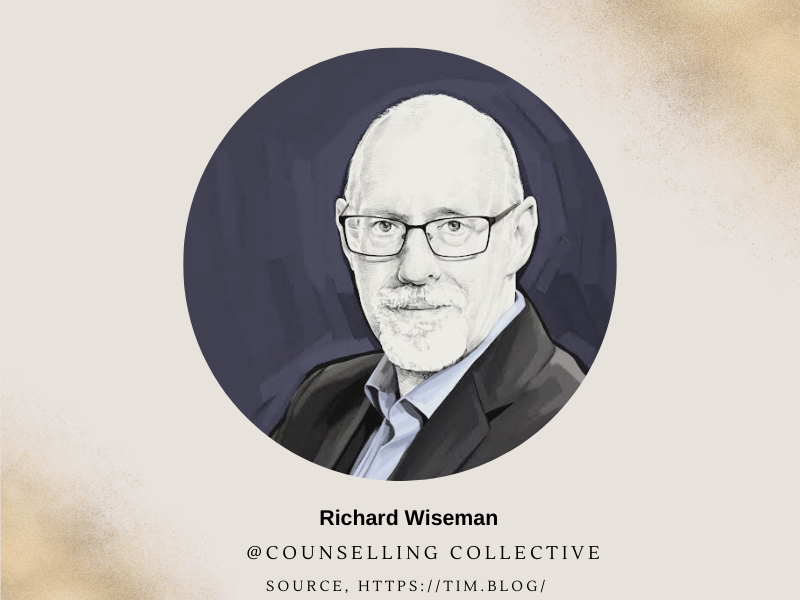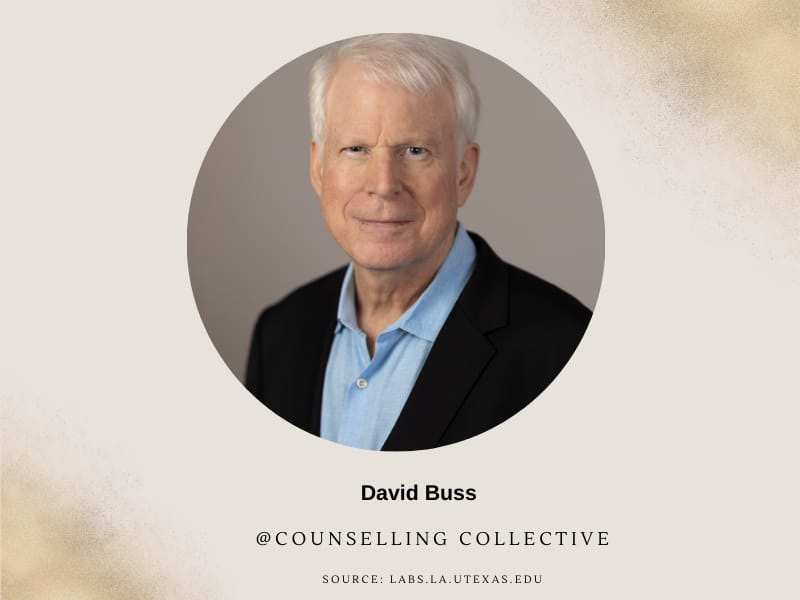Contents
Introduction
Richard Wiseman is a British psychologist and professor known for his work on luck, the paranormal, humor, and self-help. Wiseman’s research has significantly advanced our understanding of psychological phenomena that impact everyday life, such as why some people are consistently lucky, the nature of paranormal experiences, and the science behind happiness and success. His contributions have had a profound impact on psychology, public understanding of science, and skepticism. Wiseman’s engaging and accessible communication style has made him a prominent figure in promoting scientific literacy and critical thinking.

In this article, we will explore Richard Wiseman’s impactful research on luck, the paranormal, humor, and self-help, delving into how his work has enhanced our understanding of psychological phenomena in everyday life and contributed to promoting scientific literacy and critical thinking.
Early Life and Education
Richard John Wiseman was born on September 17, 1966, in Luton, Bedfordshire, England. Growing up in a working-class family, Wiseman developed an early interest in magic and illusion, which later translated into a fascination with the human mind and behavior. His parents supported his passion for magic, and he performed as a magician during his teenage years. This background in magic and illusion would later influence his psychological research, particularly his work on perception and belief.
Image Source: humanism.scot

Educational Journey
| Aspect | Details |
| Early Education | Wiseman attended local schools in Luton, where he developed a strong interest in science and the performing arts. |
| University College London | Wiseman earned his Bachelor of Science degree in Psychology in 1987. |
| University of Edinburgh | Wiseman pursued his Ph.D. in Psychology, focusing on parapsychology and the psychology of belief, completing his dissertation under the supervision of Robert Morris in 1992. |
| Academic Career | After completing his doctorate, Wiseman held academic positions at the University of Hertfordshire, where he has been a professor of psychology, conducting research on a wide range of topics and promoting public engagement with science. |
Timeline of Early Influences
| Aspect | Details |
| Robert Morris | Morris’s work on parapsychology and the psychology of belief significantly influenced Wiseman’s approach to studying paranormal phenomena. |
| James Randi | Randi’s efforts to debunk paranormal claims and promote skepticism inspired Wiseman’s work on critical thinking and the scientific investigation of unusual phenomena. |
| Derren Brown | Brown’s work as a mentalist and illusionist influenced Wiseman’s interest in the psychological principles behind magic and illusion. |
| Elizabeth Loftus | Loftus’s research on memory and eyewitness testimony shaped Wiseman’s understanding of how memory and perception can be influenced by suggestion and belief. |
Major Theories and Works

The Luck Factor
One of Richard Wiseman’s most notable contributions is his research on luck, as presented in his book The Luck Factor. Wiseman’s research identifies four key principles that lucky people use to generate good fortune in their lives:
- Maximizing Chance Opportunities: Lucky people create, notice, and act upon opportunities.
- Listening to Lucky Hunches: Lucky people make successful decisions by listening to their intuition.
- Expecting Good Fortune: Lucky people expect their positive expectations to come true, which helps them persist in the face of adversity.
- Turning Bad Luck into Good: Lucky people are resilient and use their psychological techniques to cope with and transform bad luck into good fortune.
Image Source: zen-tools.net

The Psychology of Paranormal Beliefs
Wiseman has extensively studied the psychology of paranormal beliefs and experiences. In his book Paranormality, he explores why people believe in paranormal phenomena, such as ghosts, telepathy, and psychokinesis. Key elements include:
- Cultural and Social Influences: Wiseman emphasizes the role of cultural narratives and social context in shaping paranormal beliefs. Media portrayals, folklore, and societal norms can all influence how individuals perceive and interpret unusual experiences.
- Cognitive Biases: Wiseman highlights how cognitive biases, such as confirmation bias and pattern recognition, can lead people to interpret ambiguous events as evidence of the paranormal, reinforcing their beliefs.
- Perceptual Errors: He also discusses how perceptual errors, like optical illusions or misinterpretation of sensory information, can contribute to experiences that are mistaken for paranormal phenomena.
Image Source: hoganassessments.com

The Science of Happiness and Success
In his book 59 Seconds: Think a Little, Change a Lot, Wiseman examines the science behind self-help and offers evidence-based techniques for improving happiness and success. Key elements include:
- Positive Habits: Developing and maintaining habits that support well-being, such as regular physical activity, gratitude practices, and goal setting, are fundamental for sustaining happiness and achieving long-term success.
- Mindset and Growth: Wiseman emphasizes the importance of adopting a growth mindset, where individuals believe in their capacity to improve through effort. This mindset fosters resilience, motivation, and success in various aspects of life.
Image Source: success.com

Humor and Laughter
Wiseman has also conducted research on humor and laughter, exploring how humor impacts psychological well-being and social interactions. In his book Quirkology: The Curious Science of Everyday Lives, he examines the science behind everyday oddities, including humor. Key elements include:
- Psychological Resilience: Humor and laughter play a role in building resilience, helping individuals cope with challenges and setbacks more effectively.
- Mood Enhancement: Humor can uplift mood and provide relief from stress, contributing to a more positive emotional state.
- Social Bonds: Sharing laughter and engaging in humorous interactions can strengthen relationships and foster social connections.
- Mental Health: Regular engagement with humor is linked to better mental health outcomes, including reduced anxiety and depression.
Image Source: medium.com
Psychologists Influenced by Wiseman

- Christopher French – French’s work on anomalistic psychology and the study of paranormal beliefs has been influenced by Wiseman’s research on critical thinking and skepticism (French, 2001).
- Elizabeth Loftus – Loftus’s research on memory and eyewitness testimony aligns with Wiseman’s exploration of how belief and suggestion can influence perception and memory (Loftus, 2003).
- Susan Blackmore – Blackmore’s studies on consciousness and the paranormal draw from Wiseman’s investigations into the psychological explanations for paranormal experiences (Blackmore, 1996).
- Caroline Watt – Watt’s research on parapsychology and the psychology of belief has been shaped by Wiseman’s work on the cognitive and social factors underlying paranormal claims (Watt, 2008).
- Derren Brown – Brown’s work as a mentalist and illusionist has been influenced by Wiseman’s insights into the psychological principles behind magic, illusion, and belief (Brown, 2006).
Impact on Psychology
Influence on Modern Thought
Richard Wiseman’s ideas have had a profound impact on various fields within psychology, including the study of luck, paranormal beliefs, happiness, and humor. His theories on these topics have transformed our understanding of how psychological principles influence everyday experiences and behaviors. Wiseman’s work has also influenced research methodologies, promoting the use of empirical and experimental approaches to study complex psychological phenomena. His contributions have been instrumental in bridging the gap between psychological science and public understanding, emphasizing the importance of critical thinking and scientific literacy.
Contributions to Related Fields
Wiseman’s interdisciplinary approach has extended his influence to areas such as education, public policy, and popular science. His insights into luck and success have informed educational practices, helping students develop strategies for improving their academic and personal outcomes. In public policy, Wiseman’s research on happiness and well-being has contributed to discussions on mental health and the importance of evidence-based interventions.
In the realm of popular science, Wiseman’s accessible writing and public engagement efforts have made complex psychological concepts understandable and relevant to a broad audience. His work on humor and happiness has influenced public health initiatives that aim to improve mental health and social well-being through the promotion of laughter and positive social interactions. Wiseman’s contributions have also been instrumental in promoting skepticism and critical thinking, challenging pseudoscientific beliefs, and fostering a more scientifically literate society.
Legacy and Influence
- Long-Term Impact: Richard Wiseman’s legacy endures through his lasting contributions to psychology, public engagement, and the promotion of scientific literacy. His pioneering work on luck, paranormal beliefs, and the science of happiness has laid the foundation for numerous subsequent theories and research. Wiseman’s emphasis on understanding psychological phenomena through empirical research continues to influence contemporary research and practice. His ability to communicate complex scientific ideas to both academic and public audiences has made him a key figure in promoting critical thinking and scientific understanding.
- Recognition and Honors: Wiseman has received numerous accolades and recognition for his work. He has been a frequent speaker at academic conferences and public forums, and his books have received critical acclaim and widespread readership. Wiseman’s contributions to psychology and public understanding of science have been acknowledged through various awards and honors, including the CSICOP Public Education in Science Award. His efforts to promote skepticism and critical thinking have been widely celebrated.
- Criticism and Controversies: While Richard Wiseman has garnered significant recognition for his contributions to psychology and public engagement, his work has not been without criticism. Some argue that his popular approach to science communication may oversimplify complex psychological phenomena. Additionally, the empirical validation of some of his constructs and theories has been questioned, with critics calling for more rigorous testing and validation. Despite these criticisms, Wiseman’s commitment to promoting scientific literacy and critical thinking continues to inspire debate and further investigation in the fields of psychology and beyond.
Conclusion
Richard Wiseman’s life and work have profoundly shaped the fields of psychology, public engagement, and skepticism. His theories on luck, paranormal beliefs, happiness, and humor offer valuable insights into human behavior and the complexities of psychological phenomena. By emphasizing the importance of critical thinking and scientific literacy, Wiseman has provided a comprehensive framework for understanding and improving everyday life experiences. As his legacy continues to unfold, Wiseman’s contributions to psychology, public understanding of science, and skepticism will likely inspire future generations of researchers, educators, and practitioners.
Bibliography
- [1] Blackmore, S. (1996). Test Your Psychic Powers: Find Out the Truth with These Simple Experiments. London: Thorsons.
- [2] Brown, D. (2006). Tricks of the Mind. London: Channel 4 Books.
- [3] French, C. C. (2001). Paranormal belief and anomalous experiences. In J. W. Kirsch (Ed.), Handbook of Religion and Mental Health. San Diego: Academic Press.
- [4] Loftus, E. F. (2003). The Myth of Repressed Memory: False Memories and Allegations of Sexual Abuse. New York: St. Martin’s Griffin.
- [5] Watt, C. (2008). Parapsychology: A beginner’s guide. Oxford: Oneworld Publications.
- [7] Wiseman, R. (2007). Quirkology: The Curious Science of Everyday Lives. London: Pan Macmillan.
- [8] Wiseman, R. (2009). 59 Seconds: Think a Little, Change a Lot. London: Pan Macmillan.
- [9] Wiseman, R. (2011). Paranormality: Why We See What Isn’t There. London: Macmillan.
- [10] Wiseman, R. (2014). Night School: Wake Up to the Power of Sleep. London: Pan Macmillan.






